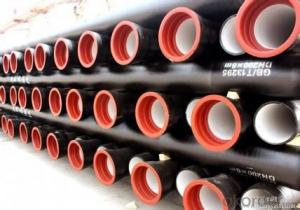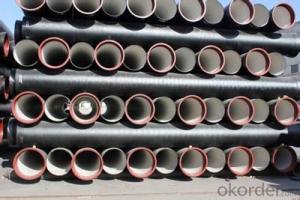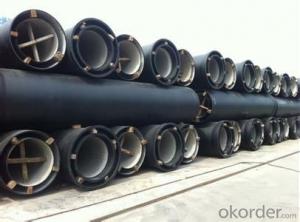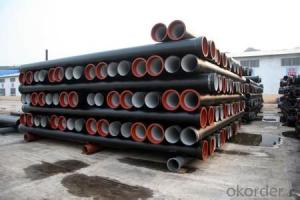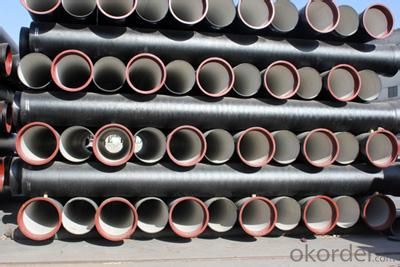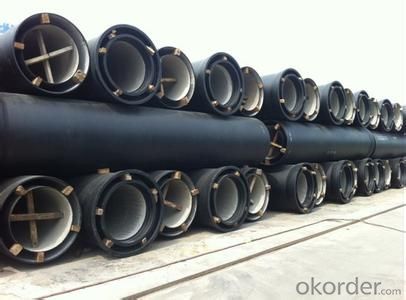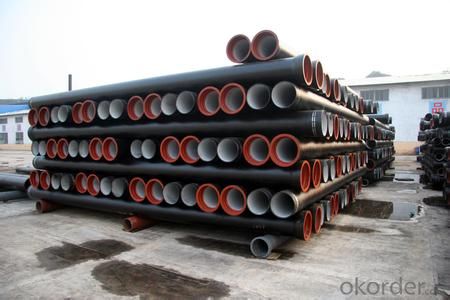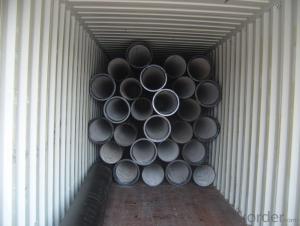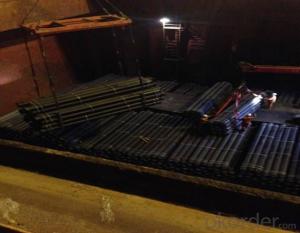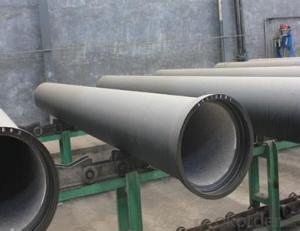DUCTILE IRON PIPE K8 DN200
- Loading Port:
- China Main Port
- Payment Terms:
- TT OR LC
- Min Order Qty:
- -
- Supply Capability:
- -
OKorder Service Pledge
OKorder Financial Service
You Might Also Like
Ductile Iron Cast Pipe is without any defects compare with tradition casting tech, which has many advantages particularly as follow:
(1) High density. In the "vertical upward casting" process, the melt iron of centre liquid column in center crystallizer is continuously feeding for volume shrinkage caused by condensation tube at outer circumference , which lead to be free of shrinkage porosity.
(2) High purity. When melt iron pouring, the mixed impurities such as gas, dross, sand grain which are lighter than melt iron could be eliminated at furnace mouth, its impossible to enter into the crystallizer through the channel, so the melt iron into the crystallizer is very pure.
(3) Strength with toughness. The cooling speed provided by continuous crystallizer is 30 times than sand casting and 5 times than centrifugal casting, and doesn't produce white iron, the eutectic cell volume of continuous cast iron is one eighth to one tenth compare with traditional cast iron. The density of graphite nodule in ductile iron can reach 300-700 pcs/mm2. Therefore, all reason above improve the strength and toughness of continuous cast iron.
(4) Free machining. The high speed cooling make the hardening phase (such as boride, steadite) not appear like reticular, massive or thick, but diffuse like fish bone and pane in shape, moreover, there are tiny graphite flakes inlaid hardening phase. It's free machining in BrinellHardness the range of 250-300HB. However, the Brinell Hardness of 250 is top limit to common metal materials.
(5) Uniform composition of tube wall. The convection mixing of liquid column caused by marching type drawing in crystallizer make the composition of tube wall well-distributed, and concentration gradient very little.
(6) High productivity. To the wall thickness of tube under 10mm, the speed of continuous casting is 1 meter/min, to the wall thickness of tube under 20mm, the speed of continuous casting is 0.5 meter/min, which is high efficiency that centrifugal or other casting tech couldn't reach.
- Q: How does ductile iron pipe perform in extreme temperatures?
- Ductile iron pipe is known for its exceptional performance in extreme temperatures. Due to its unique composition and manufacturing process, ductile iron pipe can withstand both high and low temperatures without compromising its structural integrity. In high-temperature environments, ductile iron pipe demonstrates excellent heat resistance. It can withstand temperatures up to 1000 degrees Fahrenheit, making it suitable for applications that involve hot liquids or gases, such as steam pipelines or industrial processes. The high strength and thermal stability of ductile iron allow it to maintain its shape and structural integrity even under extreme heat conditions, ensuring long-term reliability and safety. Similarly, ductile iron pipe also performs well in low-temperature environments. It can endure sub-zero temperatures without becoming brittle or prone to cracking, which is a common issue with other materials like cast iron. This makes ductile iron pipe ideal for applications in cold climates, such as water distribution systems in freezing temperatures. Furthermore, ductile iron pipe's ability to resist thermal expansion and contraction is another advantage in extreme temperatures. It has a low coefficient of thermal expansion, meaning it expands and contracts less compared to other materials. This property helps to minimize the stress on the pipe and reduces the risk of leaks or failures caused by temperature fluctuations. In summary, ductile iron pipe exhibits exceptional performance in extreme temperatures. Its heat resistance, ability to withstand low temperatures, and resistance to thermal expansion and contraction make it a reliable choice for various applications, ensuring safe and efficient operations even in challenging environments.
- Q: What is the expected thermal expansion coefficient of ductile iron pipes?
- The expected thermal expansion coefficient of ductile iron pipes varies depending on several factors, including the specific composition of the iron and the temperature range in which the pipes are being used. However, as a general guideline, the thermal expansion coefficient of ductile iron pipes typically falls within the range of 10 to 14 x 10^-6 per degree Celsius (10-14 μm/m°C). This means that for every degree Celsius increase in temperature, a ductile iron pipe will expand by approximately 10 to 14 micrometers per meter of length. It is important to note that these values are approximate and may vary depending on the specific conditions and application of the pipes.
- Q: Can ductile iron pipe be used for directional drilling?
- Yes, ductile iron pipe can be used for directional drilling. It is a strong and durable material that can withstand the stresses and forces encountered during directional drilling operations. Its flexibility and resistance to damage make it a suitable choice for this application.
- Q: The difference between cast iron pipe and ductile iron pipe
- I don't understand your question! Both have spigot and socket connection type pipe material, also have flange,
- Q: How does ductile iron pipe perform in corrosive soils?
- Ductile iron pipe performs exceptionally well in corrosive soils due to its inherent corrosion resistance properties. The pipe is made from a unique composition of iron, carbon, and other elements that enhance its durability and resistance to corrosion. One of the key features of ductile iron pipe is its protective lining. The interior of the pipe is lined with either cement mortar or a special epoxy coating, which acts as a barrier between the corrosive soil and the pipe itself. This lining protects the iron from coming into direct contact with the soil, preventing corrosion. Additionally, ductile iron pipe has a higher resistance to external corrosion when compared to other materials like steel. It can withstand the chemical reactions caused by acidic or alkaline soils and remains unaffected by the corrosive elements present in the ground. This makes it an ideal choice for installation in areas with highly corrosive soils. Furthermore, ductile iron pipe has a long service life, further contributing to its performance in corrosive soils. The durable nature of the pipe and its resistance to corrosion ensure that it can withstand the challenges posed by corrosive soils for several decades without significant degradation. In conclusion, ductile iron pipe excels in corrosive soils due to its protective lining, resistance to external corrosion, and long service life. Its ability to withstand the harsh conditions presented by corrosive soils makes it a reliable and durable choice for various applications, including water distribution, sewage systems, and industrial pipelines.
- Q: How are ductile iron pipes protected against root intrusion?
- Ductile iron pipes are protected against root intrusion through the use of protective coatings and barriers. One common method is to apply an external coating, such as a bituminous or epoxy layer, which acts as a deterrent for root penetration. Additionally, root barriers made of high-density polyethylene or other materials can be installed around the pipes to further prevent root intrusion. These measures help to maintain the structural integrity of the pipes and prevent any potential damage caused by root growth.
- Q: Can ductile iron pipe be used for hydropower systems?
- Ductile iron pipe is perfectly suitable for hydropower systems. It is renowned for its robustness, longevity, and ability to resist corrosion, making it an excellent option for numerous applications, including hydropower systems. The remarkable tensile strength of ductile iron enables it to endure the immense pressure and heavy loads associated with such systems. Additionally, its resistance to corrosion makes it ideal for use in water environments, ensuring a lengthy lifespan and minimal maintenance requirements. Consequently, ductile iron pipe can effectively serve hydropower systems by offering a dependable and efficient solution for water transportation and infrastructure support.
- Q: Can ductile iron pipes be used for underground water treatment systems?
- Indeed, underground water treatment systems can utilize ductile iron pipes. Renowned for their robustness and longevity, these pipes are well-suited for a range of uses, including underground water treatment systems. They possess exceptional resistance to corrosion, rendering them perfect for transporting water through even the harshest subterranean surroundings. Furthermore, ductile iron pipes boast a remarkable load-bearing capacity, enabling them to withstand the immense pressure and weight exerted by the soil above. Additionally, their versatility allows for simple installation and maintenance, making them a sensible option for underground water treatment systems.
- Q: Can ductile iron pipes be used for irrigation of golf courses?
- Yes, ductile iron pipes can be used for irrigation of golf courses. Ductile iron pipes are known for their durability, strength, and resistance to corrosion, making them suitable for various applications, including irrigation systems. They can withstand high-pressure water flow and are less likely to crack or break compared to other materials. Additionally, ductile iron pipes have a longer lifespan, reducing the need for frequent maintenance or replacement. Therefore, they are a reliable choice for irrigating golf courses, where a consistent and efficient water supply is crucial for maintaining healthy turf and landscaping.
- Q: How do ductile iron pipes handle ground movement due to tree roots?
- Ductile iron pipes are known for their strong and durable nature, making them highly resistant to ground movement caused by tree roots. The flexibility of ductile iron allows it to withstand the pressure exerted by growing tree roots without fracturing or breaking. This is due to the material's ability to absorb and distribute stress, which helps to minimize the impact of ground movement. Moreover, ductile iron pipes have a smooth inner surface that minimizes the chances of tree root intrusion. The tightly sealed joints between the pipes also prevent roots from penetrating and causing damage. In instances where tree roots do manage to penetrate the soil and come into contact with ductile iron pipes, their resistance to corrosion provides an added advantage. Ductile iron pipes are coated with a protective layer that prevents the formation of rust and corrosion, ensuring their longevity and structural integrity. However, it is important to note that while ductile iron pipes are highly resistant to ground movement caused by tree roots, regular inspection and maintenance are still recommended. This allows for early detection and necessary repairs to be carried out if any root intrusion or damage is identified.
Send your message to us
DUCTILE IRON PIPE K8 DN200
- Loading Port:
- China Main Port
- Payment Terms:
- TT OR LC
- Min Order Qty:
- -
- Supply Capability:
- -
OKorder Service Pledge
OKorder Financial Service
Similar products
Hot products
Hot Searches
Related keywords
